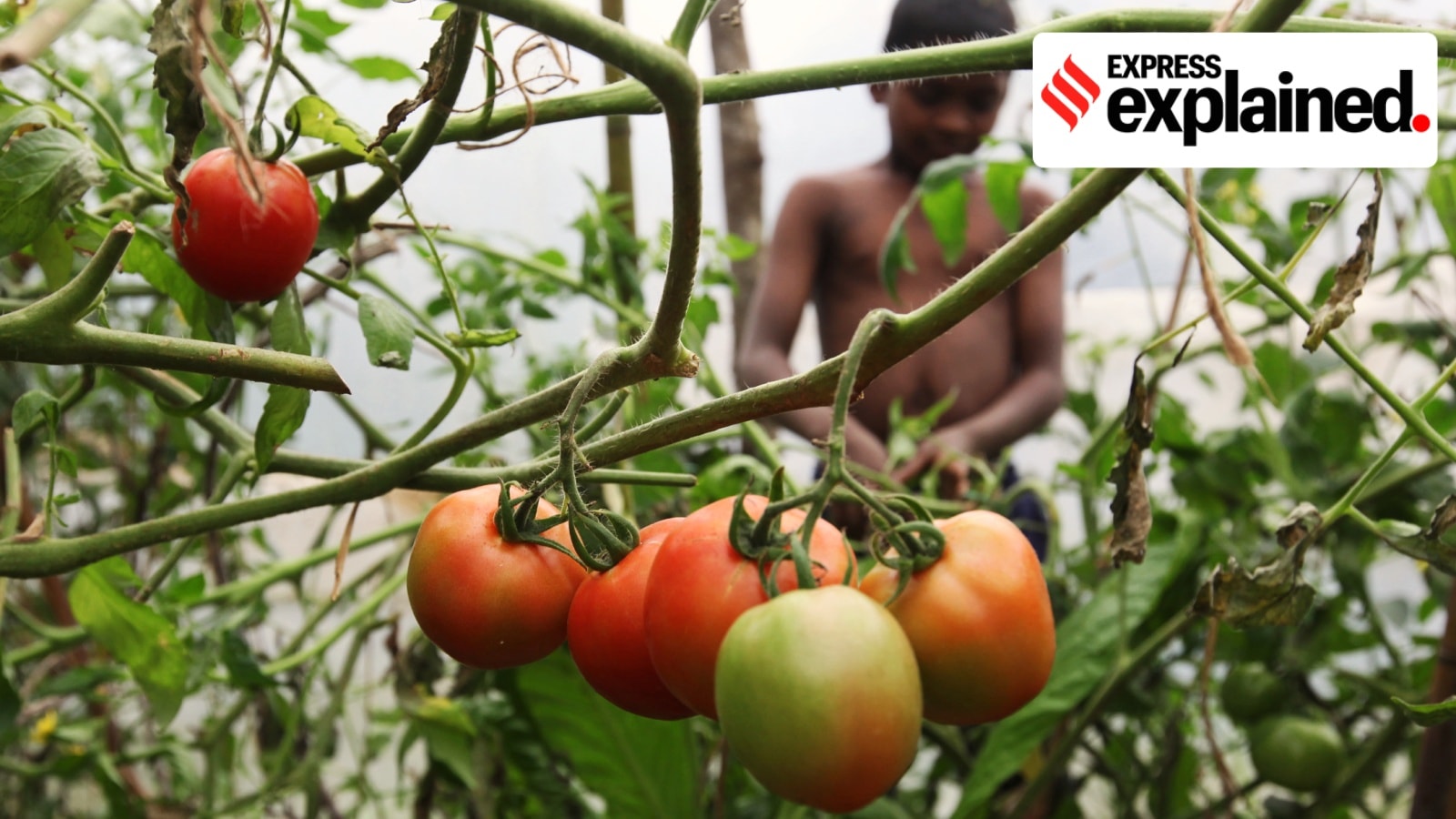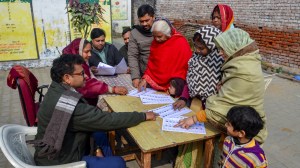Punjab Chief Minister Bhagwant Mann has said the Kissan ketchup plant in Punjab’s Patiala district, a brand owned by FMCG Hindustan Unilever Limited (HUL), requires 10,000 MT of tomato paste annually, but just 500 MT of paste is procured from Punjab, while the rest is brought from Maharashtra.
“The factory is here but tomatoes are coming from Nashik. I asked them how much we needed to produce. They said the variety required is not produced in Punjab. I made Punjab Agricultural University (PAU) scientists sit and asked them to grow the variety they were asking for. The matter has been sorted. Now the entire 10,000 MT paste will be produced here, farmers will get relief from paddy. There will be a bumper harvest that will fetch fixed money and save groundwater,” Mann had said.

However, this may be easier said than done as several other related issues need to be addressed first. We explain.
Why are Punjab’s tomato farmers not supplying to the ketchup plant?
Dr Salesh Kumar Jindal, a principal vegetable breeder at the Department of Vegetable Sciences, PAU, told The Indian Express that the tomato variety or the quantity of production were not the primary reasons for Punjab farmers not supplying tomatoes to ketchup plants.
“The issue is that the window during which the processable quality tomatoes are harvested in Punjab is very short. Also, the majority of the ketchup plants do not procure tomatoes as a whole fruit but in puree (fine paste) form. However, the processing units in Punjab lack the capacity to process 10,000 MT of tomatoes into a paste. We also have enough area under tomato cultivation, enough to make 10,000 MT paste, but processing facilities are not available easily to help the farmers,” Dr Jindal said.
Dr Jindal said several varieties available in both public and private sectors, such as PAU’s ‘Punjab Ratta’, produce tomatoes of processable quality. “Farmers are growing processable tomato varieties, but there aren’t enough processing units to turn the fruit into a fine paste for ketchup plants,” he said.
Story continues below this ad
Farmers are mainly dependent on Punjab Agro Industries Corporation Limited, a state government enterprise helping farmers in promoting agri-based industry, to get their tomato produce processed. But, according to experts, the two units of Punjab Agro in Hoshiarpur and Abohar were highly incapacitated to handle the bulk fruit production and required major technical upgrades.
How are tomatoes selected for processing?
Dr Jindal said several parameters are met before supplying tomato paste to ketchup plants, including Kissan.
“Tomato paste used for producing ketchup must have Total Soluble Solids (TSS) of 28-30 degree brix (a special unit). The colour value should be 1.8 to 2.2, which only dark red tomatoes can achieve. The blotter value (thickness measuring unit) has to be less than 10 to 15 mm per 30 minutes. We need to make such a tomato variety available to farmers which can fulfil these conditions. Punjab Ratta also largely meets these conditions.”
Where does the bottleneck lie?
According to Dr Jindal, the best quality tomatoes are harvested for a very short period due to weather conditions in Punjab and then there aren’t enough plants to make tomato paste.
Story continues below this ad
“We grow tomatoes thrice a year in Punjab. In the first cycle, transplanting is done in August and the fruit is available from November to February, but the TSS and colour value in this crop is extremely low due to harsh winters and doesn’t meet industry standards. In the second cycle, seeds are transplanted in November and harvest time is April to mid-May. The area under this cycle is merely 10 per cent as the crop has to be protected from frost. The best tomato crop is harvested in the third cycle starting with transplanting in February and the fruit is available from mid-May to mid-June. Almost 70 per cent of tomatoes in Punjab are grown in this period when the TSS and colour value are perfect for processing. But the fruit availability window is only 35-40 days due to environmental and weather conditions,” he said.
Amritsar, Kapurthala, Jalandhar, Tarn Taran, Faridkot and Sangrur districts produce tomatoes in the ideal window, whereas the August cycle is mostly followed in Patiala and Fatehgarh Sahib, which is not suitable for processing, Dr Jindal said.
“We have 10,700 hectares under tomato cultivation. To make 10,000 MT paste, 70,000 tons of raw tomatoes are required which can be produced in 2,000-2,500 hectares. So, the area is also not an issue,” he said.
According to Dr Jindal, several other private companies manufacturing ketchup in the state such as Cremica, Del Monte, Harraj Agro, TOPS, etc., procure tomatoes as per their requirement but only the government-owned Punjab Agro could manage the bulk processing in the state.
Farmers’ ordeal
Story continues below this ad
Farmers, however, said they face “gross mismanagement and inconvenience” when they transport their tomato produce to Punjab Agro units for processing.
Gurpreet Singh, 45, a tomato farmer from Ghugiana in Faridkot district, who owns 20 acres, said he stopped taking his produce to Punjab Agro’s Abohar plant due to “poor management, facilities and untimely payment”.
“We were earlier supplying tomatoes to Punjab Agro for Rs 5.50 per kg but their management was extremely poor. Payments were not timely and there were no logistics. I am now supplying to Cremica for Rs 6.5 per kg and we get money on the spot. At Punjab Agro, we even had to wait for up to four days to unload the produce,” he said.
Jaswinder Singh, 42, from Asarpura village in Patiala, said he sells his produce in mandis in Ludhiana and Chandigarh. “A few farmers from our village spoke with the Kissan plant management, but they said they had an agreement with Maharashtra farmers. We are ready to give tomatoes to them provided there’s a fixed agreement and assured price,” he added.
Story continues below this ad
Sanjeev Gupta, sector officer, processing, Punjab Bureau of Investment Promotion (PBIB), Chandigarh, said Punjab farmers were producing more table tomatoes (used in kitchens) than required for processing. “Punjab Agro is working to upgrade its capacity and technology. The target is to supply at least 3,000 MT of paste by 2025. The fruiting season of tomatoes in Punjab is limited and several aspects need to be seen for processing. A new plant at Ladhowal in Ludhiana should be made operational soon.”
Ranbir Singh, general manager of Punjab Agro, said tomatoes were being processed at Abohar and Hoshiarpur plants. “Our current capacity is 15-18 tonnes per hour. The target is to upgrade it to 50 tonnes/hour. We are already supplying paste to several private players. We supply 2,000 MT in peak season which we aim to double by 2026. We have Italian machinery, so upgrading is a time-consuming process.”








































